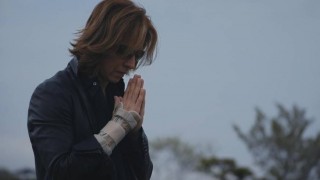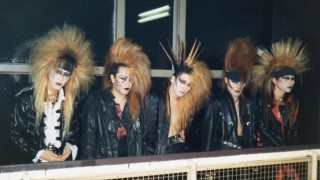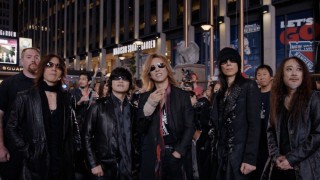Loading
Search
▼ Yoshiki: ‘We Had to Make Our Own World’
- Category:Event
Yoshiki Hayashi hardly sleeps. The drummer, pianist, songwriter and leader of rock band X Japan has been in and out of the country constantly these past few months, promoting his band’s new documentary film, “We Are X.” At the same time he has been performing solo concerts, recording and squeezing in all the things the rest of us simply recognize as everyday life.
In one scene of “We Are X,” he speaks of his sleeping patterns: not much on a daily basis, but he takes a day every two weeks in which he sleeps for about 10 hours straight. Aside from that, he is working.
After a slew of appearances and screenings at film festivals around the world, including South By Southwest and Sundance, the documentary, directed by American Stephen Kijak (“Stones In Exile”), finally hit Japanese theaters on March 3.
“The response to the film has been overwhelmingly similar all over the world,” says Yoshiki, speaking to The Japan Times at the Grand Hyatt in Roppongi after the movie’s Japan premiere. “While it’s a documentary of a rock band, it’s more of a human drama where the people just happen to be musicians. I was surprised to hear that people who had never heard of X Japan were also very moved by it; it didn’t matter where they were from.” The film tells the story of X Japan prepping for its show at New York’s Madison Square Garden in October 2014. As both the band and crew count down the days to the performance, the film is intercut with interviews and moments from X Japan’s history.
The story of the band should be familiar to many fans of Japanese music from the 1990s. Consisting of Yoshiki, singer Toshimitsu “Toshl” Deyama, bassist Taiji Sawada, and guitarists Hideto “hide” Matsumoto and Tomoaki “Pata” Ishizuka, the five-piece pioneered the visual-kei rock movement, which spawned countless followers and imitators in Japan.
The band, which was originally just known as X, formed in 1982 and its members soon became known for their flamboyant glam-inspired makeup and heavy sound influenced by the speed and LA metal of the ’80s. They skyrocketed to fame after signing to a major label in 1989, and soon became some of the most dominating figures of mainstream Japanese music. Later, they set their sights overseas and signed with American imprint Atlantic Records in 1992, rechristening themselves as X Japan. The signing and name change happened along with a personnel change, when Taiji was fired from the band (for reasons Yoshiki still refuses to talk about to this day) and replaced by bassist Hiroshi “Heath” Morie.
A series of unfortunate events struck the band soon after, however. First, Toshl decided to leave, after being brainwashed by a religious cult that convinced the singer that the band was evil. His departure ultimately led to the dissolution of the group in 1997. Soon after, guitarist hide was found dead from an apparent suicide (although many, including the band members, dispute the claim and believe it was an accident). Toshl managed to leave the cult almost a decade later to return to the band, starting up a reunion and a rekindled interested from music fans. Yune “Sugizo” Sugihara of Luna Sea joined the newly reformed lineup in 2009.
Then, in 2011, another tragedy — former bassist Taiji committed suicide. “This band has had a lot of drama. I remember each one, but when you see it all at once it has an impact that even I wasn’t expecting,” says Yoshiki about the legacy of his band. “There was a part of me that thought — or hoped — it was a dream. For example, the death of hide. In my mind, hide was still alive. But when I saw the film, the reality of it hit me.”
The film is as much about X Japan as it is about Yoshiki, who has endured both physical and emotional pain himself over the years. His father committed suicide when he was 10 years old, which led him on an endless journey questioning the meaning of family, life and identity, perhaps explaining the almost masochistic drive he has. He speaks about death and suicide openly in the film, stating that he believes suicide to be ultimately selfish and unjustified.
Yoshiki also suffers from constant pain in his wrists and arms, a result of torn ligaments from playing piano and drums. He also has to wear a protective neckbrace when performing live because of damage done from all the intense headbanging from over the years. The film shows the treatments and shots he receives for his injuries, with one doctor urging him to take a break.
“There were a lot of scenes in the movie that I wish they didn’t show,” Yoshiki says with a laugh. “But I let the director do whatever he wanted. I would understand if this film came out after we were all dead, but the fact that we’re still alive; there are moments in this film that I wonder if it’s OK to show all of that.”
The film positions X Japan as a national hidden gem; enormously famous at home, but virtually unknown in the West. It isn’t shy about the band’s lack of visibility in the American music scene, but instead embraces it, using the documentary as a primer for English-speakers to get up to speed on the group’s mythology. For Japanese fans and those familiar with the X story, the film provides a revealing look into the band and Yoshiki’s absolute determination to always reach for the next level, which for the past two decades has been to operate on a global scale. The attempt hasn’t been without its struggles.
“I think the wall for Japanese artists trying to make it in America is getting thinner and lower every day, but it’s still there,” Yoshiki says, referring to the difficulty of Japanese artists trying to succeed in the U.S.
“Rock music has this image of being more advanced in the Western world. I don’t think that wall will disappear tomorrow, but at the same time it makes trying to break it more worthwhile. I feel that this film and story has been able to touch people beyond borders, however. So I think this film has opened a new door for us.”
A bulk of the film is in English, including Yoshiki’s interviews (he speaks it fluently throughout the film). The result is an interesting bilingual and cross-cultural take on a band that is both distinctively Japanese and yet also very much influenced by Western rock culture.
“We were never part of anything. We weren’t accepted. So we had to make our own world. I think that connects to what visual-kei was all about,” Yoshiki says. “I don’t think you should wait for the tide; you need to make your own waves. The fact that we were playing music that was a little different, the fact that we were unaccepted, worked as a positive for us.
“I think when we started, it was a time when various cultures were starting to mix together. Postwar Japan had gone through many changes and it brought in influences from Western culture. At the same time, Japan also kept its traditions. So we grew up watching anime and listening to hard rock. But we also liked David Bowie. We soaked up everything in a neutral, unbiased way, and back then I was also playing classical music and rock music. Why couldn’t those two be together? I started in a place that had no rules. But once I actually starting pursuing music, I found that there were many rules. I thought rock music was freer. So that’s when I decided to create my own opportunities.”
Those opportunities are what “We Are X” is ultimately about. Despite the struggles and tragedies (or perhaps because of them), Yoshiki is more driven than ever.
“X means infinite possibilities. The fact that we’re still here after such tumultuous drama is amazing,” he says. “Hopefully, right now we are laying the foundations for another documentary. Maybe 10 years later, we can make one where the stage is not just Japan, but the world.”
He adds, “I just hope it doesn’t end up having as much tragedy as this film.”
“We Are X” is now playing in cinemas nationwide. For more information, visit www.wearexfilm.com.
- March 16, 2017
- Comment (0)
- Trackback(1)
Comment(s) Write comment
Trackback (You need to login.)
You are looking sharp !
- cheap albion online silver for sale
- March 25, 2017




